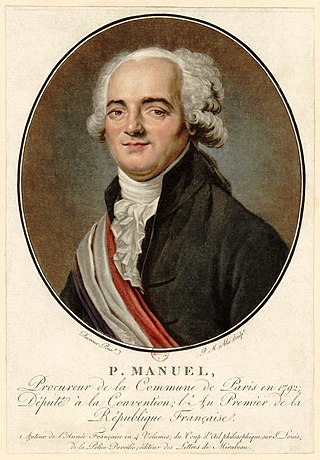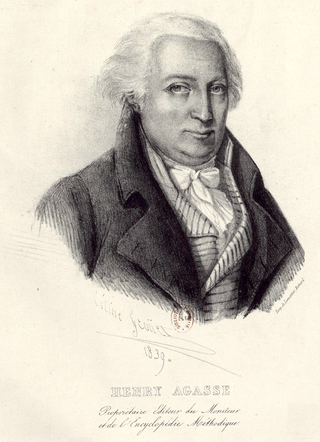
The French Republican calendar, also commonly called the French Revolutionary calendar, was a calendar created and implemented during the French Revolution, and used by the French government for about 12 years from late 1793 to 1805, and for 18 days by the Paris Commune in 1871.

Augustin Barruel was a French publicist and Jesuit priest. He is now mostly known for setting forth the conspiracy theory involving the Bavarian Illuminati and the Jacobins in his book Memoirs Illustrating the History of Jacobinism published in 1797. In short, Barruel wrote that the French Revolution was planned and executed by the secret societies.

The Bibliothèque nationale de France is the national library of France, located in Paris on two main sites known respectively as Richelieu and François-Mitterrand. It is the national repository of all that is published in France. Some of its extensive collections, including books and manuscripts but also precious objects and artworks, are on display at the BnF Museum on the Richelieu site.

Louis Pierre Manuel was a republican French writer, municipal administrator of the police, and public prosecutor during the French Revolution who was arrested, trialled and guillotined.

The September Massacres were a series of killings of prisoners in Paris that occurred in 1792, from Sunday, 2 September until Thursday, 6 September, during the French Revolution. Between 1,176 and 1,614 people were killed by fédérés, guardsmen, and sans-culottes, with the support of gendarmes responsible for guarding the tribunals and prisons, the Cordeliers, the Committee of Surveillance of the Commune, and the revolutionary sections of Paris.

Hugues-Bernard Maret, 1st Duke of Bassano, was a French statesman, diplomat and journalist.

Charles-Joseph Panckoucke was a French writer and publisher. He was responsible for numerous influential publications of the era, including the literary journal Mercure de France and the Encyclopédie Méthodique, a successor to the Encyclopédie by Denis Diderot.

Joseph Fiévée was a French journalist, novelist, essayist, playwright, civil servant and secret agent. He also lived in an openly gay relationship with the writer Théodore Leclercq (1777-1851), with whom he was buried after his death.

La Gazette, originally Gazette de France, was the first weekly magazine published in France. It was founded by Théophraste Renaudot and published its first edition on 30 May 1631. It progressively became the mouthpiece of one royalist faction, the Legitimists. With the rise of modern news media and specialized and localized newspapers throughout the country in the early 20th century, La Gazette was finally discontinued in 1915.

Charles Thévenin was a neoclassical French painter, known for heroic scenes from the time of the French Revolution and First French Empire.

Maximilien François Marie Isidore de Robespierre was a French lawyer and statesman who became one of the best-known, influential and controversial figures of the French Revolution. As a member of the Estates-General, the Constituent Assembly, and the Jacobin Club, he campaigned for universal manhood suffrage, the right to vote for people of color, Jews, actors, domestic staff and the abolition of both clerical celibacy and French involvement in the Atlantic slave trade. In 1791, Robespierre was elected as "public accuser" and became an outspoken advocate for male citizens without a political voice, for their unrestricted admission to the National Guard, to public offices, and to the commissioned ranks of the army, for the right to petition and the right to bear arms in self defence. Robespierre played an important part in the agitation which brought about the fall of the French monarchy on 10 August 1792 and the convocation of the National Convention. His goal was to create a one and indivisible France, establish equality before the law, abolish prerogatives, and defend the principles of direct democracy. He earned the nickname "the incorruptible" for his adherence to strict moral values.

Newspapers have played a major role in French politics, economy and society since the 17th century.
André-Joseph Panckoucke was a French author and bookseller. He was the first of the Panckoucke family directly or indirectly involved in French publishing.

Dominique-Vincent Ramel was a French lawyer and politician who became Minister of Finance under the French Directory. He was an energetic reformer, but was blamed for many of the financial problems of the time, and went into retirement during the French Consulate and First French Empire. He supported Napoleon during the Hundred Days of 1815. After the second Bourbon Restoration, as a regicide he was forced into exile in Belgium, where he died without returning to France.

Henri Agasse, was a French publisher and editor, associated with Charles-Joseph Panckoucke.
Pierre-Ange Vieillard de Boismartin was a 19th-century French poet, playwright and literary critic.

Charles-Louis-Fleury Panckoucke was a French writer, printer, bookseller, publisher, translator, and editor. His father was Charles-Joseph Panckoucke.

Thomas-Augustin de Gasparin, was a French military officer and député for the Bouches-du-Rhône departement to the National Legislative Assembly and the Convention.
















